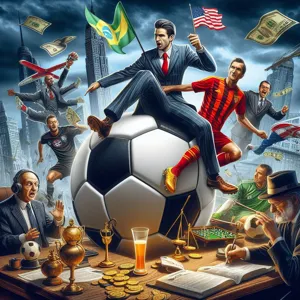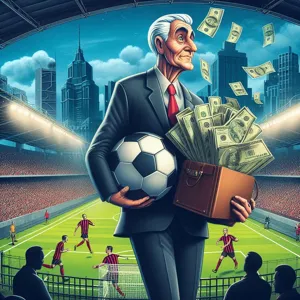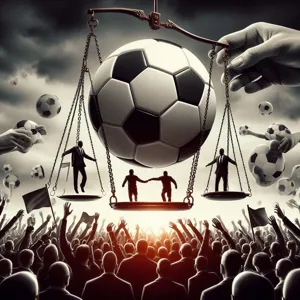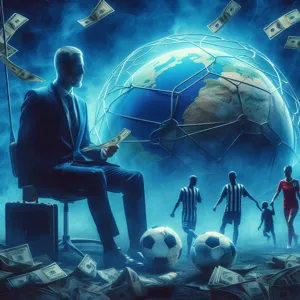Soccer, often referred to as “the beautiful game,” has captivated hearts and minds across the globe, uniting fans under the vibrant banners of their favorite clubs and national teams.
However, beneath the surface of this beloved sport lies a troubling undercurrent: corruption. From match-fixing scandals to financial misconduct, the integrity of soccer has been challenged time and again, casting a shadow over its most thrilling moments. In this blog post, we will delve into the pervasive impact of corruption on soccer, examining how it undermines the principles of fair play and sportsmanship while disenfranchising loyal fans. As we explore the far-reaching consequences of these unethical practices, we’ll uncover not only the damage inflicted on the sport itself but also the broader societal implications that resonate beyond the pitch. Join us as we kick integrity to the curb and shed light on the critical need for reform to protect the essence of soccer we all cherish.
1. Introduction: The Allure of Soccer and the Shadow of Corruption

Soccer, often referred to as “the beautiful game,” has a magnetic quality that transcends borders, languages, and cultures. It captivates millions around the globe, uniting people in their shared passion for the sport. From the roar of the crowd in packed stadiums to the tension of a penalty shootout, soccer stirs emotions that can bring both joy and heartbreak. It is a game filled with rich history, legendary players, and unforgettable moments that etch themselves into the hearts of fans.
Yet, beneath this vibrant surface lies a troubling undercurrent of corruption that threatens the integrity of the sport. Scandals involving match-fixing, bribery, and governance failures have repeatedly surfaced, casting a long shadow over the game’s reputation. The allure of wealth and power can lead individuals and organizations to compromise their values, undermining the very essence of fair play that soccer stands for.
As we delve into the complex relationship between corruption and soccer, we must confront the uncomfortable truth: the sport we love is not immune to the darker forces that seek to exploit its popularity. This introduction sets the stage for an exploration of how these corrupt practices not only affect the players and officials involved but also erode the trust of fans and tarnish the legacy of the game itself. In examining the impact of corruption on soccer, we will uncover the challenges and consequences that arise when integrity is kicked to the curb.
2. Defining Corruption in Soccer: What Does It Look Like?
Corruption in soccer manifests in various forms, each undermining the integrity and spirit of the beautiful game. At its core, corruption is the abuse of power for personal gain, and in the world of soccer, it can take on multiple faces. One of the most visible forms is match-fixing, where players, referees, or officials conspire to manipulate the outcomes of games for betting profits. This not only taints the result but also deceives fans who passionately support their teams, believing they are witnessing fair competition.
Another prominent aspect of corruption lies in bribery and kickbacks, often seen in the dealings of officials and governing bodies. Contract negotiations, sponsorship deals, and even the awarding of hosting rights for major tournaments can be marred by unethical practices. When decision-makers prioritize personal enrichment over the welfare of the sport, it erodes trust and creates a toxic atmosphere where accountability is absent.
Furthermore, corruption can seep into the grassroots of the game, affecting youth academies and local clubs. When money becomes the primary motivator, the focus shifts away from player development and community engagement, leading to a decline in the foundational values that soccer embodies. This ripple effect not only compromises the integrity of the players who aspire to reach the professional level but also diminishes the overall quality of the sport.
Finally, the culture of silence surrounding corruption must be addressed. Whistleblowers often face retaliation, and those who expose wrongdoing can find themselves ostracized within the sport. This culture stifles accountability and perpetuates a cycle of corruption that can seem insurmountable. As we delve deeper into the impact of corruption on soccer, it becomes clear that recognizing and defining these corrupt practices is the first step toward reclaiming the integrity of the game we all love.
3. A Brief History of Scandals in Soccer

Soccer, often hailed as “the beautiful game,” has been marred by a series of scandals that have shaken the very foundation of its integrity. The history of corruption in soccer is as colorful as it is troubling, stretching back to the early 20th century when match-fixing and bribery began to rear their ugly heads. One notable incident occurred in the 1915 British Football League, where a series of matches were manipulated, leading to severe repercussions for those involved.
Fast forward to the 1990s, and the sport found itself embroiled in the infamous Calciopoli scandal in Italy, which exposed widespread corruption involving top clubs, referees, and officials. Juventus, one of the most storied clubs in the world, was stripped of its titles and relegated, highlighting how deep the rot had set in.
As we moved into the 21st century, the global stage faced even bigger shocks. The 2015 FIFA corruption scandal, which unveiled a sprawling web of bribery and racketeering involving senior FIFA officials, sent shockwaves throughout the sport. High-ranking executives were indicted in the United States, leading to the resignation of then-FIFA President Sepp Blatter and raising questions about the governance of soccer worldwide.
These scandals not only tarnish the reputation of the sport but also undermine the trust of fans, players, and sponsors alike. They serve as poignant reminders that while soccer is celebrated for its passion and unity, it is often beset by the darker aspects of human nature, where greed and corruption threaten the sanctity of the game. As we delve deeper into the implications of these scandals, it becomes clear that restoring integrity is not just desirable but essential for the future of soccer.
4. The Role of Governing Bodies: FIFA and UEFA’s Involvement
The role of governing bodies like FIFA and UEFA cannot be overstated when examining the impact of corruption on soccer’s beautiful game. These organizations are responsible for establishing the rules of play, ensuring fair competition, and promoting the sport globally. However, their involvement has often been marred by scandal and controversy, leading to a tarnished reputation that casts a long shadow over the sport.
FIFA, the sport’s global governing body, has faced numerous allegations of corruption over the years, particularly regarding the bidding processes for the World Cup. The revelations of bribery and kickbacks have shaken the foundation of trust that fans and players place in the organization. High-profile figures within FIFA have been indicted, and these scandals have raised questions about the integrity of the sport itself. The effects ripple down to the grassroots level, where aspiring players and fans begin to wonder whether hard work and talent can truly lead to success in a game that seems increasingly influenced by money and deceit.
Similarly, UEFA, responsible for governing European soccer, has not been immune to scrutiny. While the organization has made efforts to promote fair play and transparency, instances of favoritism and financial misconduct have surfaced, highlighting the complex interplay between power and integrity. The controversial distribution of funds from tournaments like the UEFA Champions League often leads to accusations of unequal treatment, leaving smaller clubs and leagues feeling marginalized.
Together, FIFA and UEFA hold the keys to reform, but the path forward is fraught with challenges. Calls for transparency, accountability, and ethical governance are growing louder, as fans and players alike demand a return to the core values of the game. The need for a reevaluation of leadership, along with stringent regulations to combat corruption, has never been more pressing. If these governing bodies can rise to the occasion, they may reclaim the integrity of soccer and ensure that the beautiful game remains just that—beautiful, fair, and worthy of the admiration it commands around the world.
5. Case Studies: High-Profile Corruption Cases in Soccer

When discussing the fraught relationship between corruption and soccer, it’s essential to delve into the high-profile cases that have rocked the sport and left an indelible mark on its integrity. The tales of deceit, manipulation, and scandal are as dramatic as any match, showcasing how corruption can undermine the very foundation of what makes soccer the beautiful game.
One of the most notorious examples is the FIFA corruption scandal that erupted in 2015, shaking the organization to its core. High-ranking officials were arrested on charges of racketeering, wire fraud, and money laundering, revealing a web of bribery that extended across continents. The investigation uncovered that millions of dollars had exchanged hands in shady deals for broadcasting rights and tournament hosting privileges, leading to a significant loss of faith among fans and players alike. The fallout was immense, resulting in the resignation of longtime FIFA President Sepp Blatter and a comprehensive overhaul of the organization’s governance structures.
Another prominent case centers around the Italian Serie A, where the Calciopoli scandal in 2006 exposed an intricate network of collusion between club officials and referees. Major clubs, including Juventus, AC Milan, and Fiorentina, were implicated in a scheme designed to influence match outcomes in their favor. The scandal not only led to Juventus being stripped of its titles and relegated to Serie B but also sparked outrage among fans who felt cheated and disillusioned by the betrayal of their beloved teams. The ripple effects of Calciopoli continue to influence Italian soccer, as the sport grapples with the tarnished legacy of those involved.
In South America, the corruption crisis within the Confederación Sudamericana de Fútbol (CONMEBOL) has also drawn attention. In 2019, several former officials were indicted for their roles in a vast bribery scheme linked to the Copa Libertadores and other tournaments. The allegations revealed a troubling culture of corruption that prioritized personal gain over the sport’s integrity, leading to widespread calls for reform and greater transparency within the organization.
These case studies illustrate that corruption in soccer is not merely an isolated issue; it is a systemic problem that threatens the sport’s future. Each scandal serves as a reminder that the beautiful game can quickly become tainted when integrity is compromised, prompting the need for vigilant oversight and accountability. As fans, players, and officials continue to advocate for a cleaner sport, the lessons learned from these high-profile cases will be critical in safeguarding the integrity of soccer for generations to come.
6. The Impact of Corruption on Players and Fans
Corruption in soccer casts a long shadow over the beautiful game, affecting not only the integrity of the sport but also the lives of players and fans alike. For players, the implications can be profound. When match-fixing scandals come to light, athletes find themselves grappling with a crisis of credibility. The achievements they have worked tirelessly for can be overshadowed by the taint of corruption, leading to a loss of trust from fans and sponsors. Young talents, in particular, may become disillusioned, questioning whether their hard work will ever be justly rewarded in a landscape rife with deceit.
Fans, the lifeblood of soccer, are equally affected. Every time a scandal breaks, it diminishes the joy of watching their favorite teams and players. The thrill of a last-minute goal or a spectacular save is inevitably marred by the suspicion that the outcome may have been manipulated. For many supporters, soccer is more than a game—it’s a community, a shared passion, and a source of identity. When corruption infiltrates the sport, that connection is strained, leading to feelings of betrayal and anger. Moreover, ticket sales can plummet, and merchandise purchases may decline as fans choose to distance themselves from a game they feel has lost its authenticity.
As the sport grapples with these issues, the ripple effects extend beyond the pitch. families who bond over watching games together may find themselves in conflict over allegations of corruption, as differing opinions on the integrity of the sport emerge. Furthermore, the financial repercussions can be devastating for clubs, especially smaller ones that rely heavily on fan support. In a world where loyalty is paramount, corruption threatens to erode the foundation of soccer, leaving a void that can take years to heal.
Ultimately, the impact of corruption in soccer is a double-edged sword, undermining the aspirations of players and shattering the dreams of fans. To restore the integrity of the game, a collective effort is needed—one that emphasizes transparency, accountability, and a shared commitment to preserving the essence of what makes soccer truly beautiful.
7. Financial Implications: How Corruption Affects the Economy of the Sport

Corruption in soccer doesn’t just tarnish the sport’s integrity; it reverberates through the economy of the game, leading to significant financial implications that can devastate clubs, leagues, and even entire nations. At the heart of this issue is the misallocation of funds, where money intended for grassroots development, stadium infrastructure, or player welfare is siphoned off into the pockets of corrupt officials or shady deals. This not only stunts the growth of the sport at the community level but also leads to a decline in the overall quality of play, as fewer resources are available to nurture young talent.
Moreover, the financial ramifications extend to sponsorships and partnerships. Corporations are increasingly wary of associating their brands with a sport mired in scandal, leading to fewer sponsorship deals and reduced revenue. This creates a vicious cycle: less funding means fewer resources for development, which in turn leads to a less attractive product for sponsors. The ripple effect can be seen in reduced ticket sales as fans become disillusioned with the sport, resulting in empty stadiums and diminished matchday revenues.
On a broader scale, national economies can suffer immensely. In countries where soccer is not just a sport but a key part of cultural identity, corruption can lead to civil unrest and a loss of faith in not only the sport but in governing bodies as well. When public funds are mismanaged or misappropriated, communities that rely on soccer for economic stimulation—through tourism, local businesses, and job creation—are left to grapple with the fallout.
In this way, corruption doesn’t merely represent a breach of ethics; it poses a grave threat to the very fabric of the game, undermining the economic vitality that soccer can foster. If we hope to preserve the beauty of soccer, it’s crucial to confront these financial implications head-on, ensuring that the sport can thrive for generations to come.
8. Corruption’s Effect on Youth Development and Grassroots Programs
Corruption in soccer doesn’t just tarnish the game at the professional level; it seeps down to the very roots of the sport, eroding youth development and grassroots programs that are essential for nurturing the next generation of players. When funds intended for training, facilities, and community engagement are siphoned off through corrupt practices, the repercussions are felt far and wide.
Imagine a young aspiring athlete whose dreams hinge on access to quality coaching and resources. In a corrupt system, those resources often become limited or misallocated, leaving potential superstars without the necessary support to hone their skills. Local clubs, which should serve as nurturing grounds for talent, may find themselves struggling to provide even the most basic training equipment or safe fields for practice. Instead of focusing on developing young players, coaches are forced to divert their energies toward fundraising efforts, or worse, navigating a web of dishonest dealings to secure what should already be theirs.
Moreover, corruption can breed cynicism among young athletes and their families. When they witness favoritism in player selections or financial irregularities within their clubs, the very essence of fair play and meritocracy—the values that soccer is supposed to uphold—begins to dissolve. Young players may lose faith in the sport, opting to pursue other paths, while families become disillusioned and withdraw their support.
Grassroots programs, which are the lifeblood of soccer’s future, suffer immensely. With less community investment and trust, the vibrant local leagues that foster not just athletic prowess but also teamwork, discipline, and sportsmanship begin to wither. This disconnect not only diminishes the immediate talent pool but also jeopardizes the long-term health of the sport. In a world where integrity is compromised, the beautiful game risks losing its very foundation, leaving behind a legacy of corruption that could haunt soccer for generations to come.
9. Media Influence: How Coverage Shapes Public Perception
In an era where information flows freely at the speed of light, media coverage plays a pivotal role in shaping public perception, particularly in a sport as globally revered as soccer. The narratives constructed by journalists, broadcasters, and online influencers can elevate a team’s triumphs or tarnish its reputation with a mere headline or tweet. When corruption scandals erupt, the media’s portrayal can either amplify outrage or dilute accountability, influencing how fans, sponsors, and governing bodies respond.
Take, for instance, the sensationalized reporting surrounding high-profile corruption cases within FIFA. Allegations of bribery and match-fixing not only dominate news cycles but also shift the lens through which fans view the game. A once-celebrated tournament can quickly become synonymous with scandal, leading to a sense of disillusionment among supporters and a decline in viewership. When stories focus on the misdeeds of officials rather than the skill of the players, it fosters a narrative of distrust that permeates the sport.
Moreover, the rise of social media has democratized the dissemination of information. Fans now wield the power to amplify their voices, sharing their perspectives on corruption and governance in soccer. This can lead to grassroots movements calling for accountability and reform, but it can also result in a mob mentality where players and clubs are subjected to relentless scrutiny. The media’s coverage—whether it’s investigative journalism bringing corruption to light or biased commentary promoting sensationalism—can either inspire change or perpetuate a culture of cynicism.
Ultimately, the influence of media on public perception cannot be understated. Responsible and balanced reporting can foster a deeper understanding of the issues at hand, while sensationalist coverage risks overshadowing the very essence of the game. In the fight against corruption, it is crucial for the media to navigate these narratives thoughtfully, as their portrayal of events shapes not only the public’s view of soccer but also the future integrity of the sport itself.
10. The Global Reach of Corruption: Impact on International Competitions
Corruption in soccer doesn’t just taint local leagues; it sends ripples through the very fabric of international competitions, threatening the integrity of the global game. When scandals erupt, they often cast long shadows over prestigious tournaments like the FIFA World Cup and continental championships, such as the UEFA European Championship. The impact is profound, affecting not only the teams and players involved but also the passionate fans whose love for the game can be tarnished by the taint of impropriety.
Consider the implications of match-fixing, which can manipulate the outcomes of crucial games, leading to unfair advantages and unjust eliminations. Fans invest their emotions, time, and money into supporting their national teams, and when the integrity of the competition is compromised, it can lead to widespread disillusionment. The thrill of cheering for a team that triumphs against all odds is undermined when the outcome is determined not by skill and dedication, but by corruption.
Moreover, the global reach of corruption extends beyond the pitch. It erodes trust in governing bodies, prompting fans and stakeholders to question the legitimacy of international competitions. Allegations of bribery and collusion can lead to boycotts and protests, as supporters demand accountability and transparency from the organizations that oversee the game. This loss of faith can have lasting consequences, dissuading future generations from engaging with the sport, thus threatening the very essence of soccer as a unifying force worldwide.
As we witness corruption’s pervasive influence, it becomes increasingly clear that safeguarding the integrity of international soccer competitions is paramount. It requires collective action from players, officials, fans, and governing bodies alike to restore trust and ensure that the beautiful game remains a fair and cherished experience for all. Only by confronting corruption head-on can we hope to preserve the spirit of the sport and protect its legacy for future generations.
11. Tackling Corruption: Efforts and Reforms in the Soccer World
Corruption has long cast a shadow over the beautiful game, but the soccer world is not sitting idly by. In recent years, there has been a global push to tackle corruption head-on, driven by passionate advocates who believe in the sanctity of the sport. From grassroots initiatives to high-level reforms, efforts are underway to restore integrity and transparency to soccer.
One of the most significant movements has been spearheaded by FIFA itself, which has undertaken a series of reforms aimed at increasing accountability within its ranks. The establishment of independent committees to oversee financial transactions and player transfers marks a monumental shift in an organization that has faced its fair share of scandals. Additionally, FIFA’s introduction of a whistleblower program encourages individuals within the sport to report misconduct without fear of repercussions, fostering an environment of openness and honesty.
At the club level, many organizations are following suit by implementing their own internal policies designed to promote fair play and ethical behavior. Training programs for players, coaches, and staff emphasize the importance of integrity both on and off the pitch, reinforcing the idea that success should not come at the expense of ethical standards.
Moreover, international coalitions are forming to address corruption collectively. Organizations like Transparency International have begun to partner with soccer federations around the world to share best practices and develop comprehensive anti-corruption strategies. These collaborations highlight a growing recognition that corruption is a pervasive issue that transcends borders and requires a united front to combat effectively.
Fan engagement is another crucial aspect of the reform movement. Supporters, often the lifeblood of the sport, are becoming increasingly vocal about their disdain for corruption. Various fan groups are organizing campaigns to demand greater transparency from clubs and governing bodies, and their voices are being heard. The rise of social media has amplified these efforts, turning passionate fans into powerful advocates for change.
As these initiatives gain momentum, the impact on the game itself is becoming evident. With increased scrutiny and more robust regulations in place, there is hope that the culture of corruption will gradually give way to one rooted in fairness and respect for the sport. While the road ahead may be fraught with challenges, the collective will of players, officials, fans, and organizations reflects a shared commitment to reclaiming soccer’s integrity and ensuring that the beautiful game remains just that—beautiful.
12. The Role of Technology in Promoting Transparency
In an era where digital innovation is reshaping industries, soccer is no exception. The role of technology in promoting transparency within the sport has become increasingly vital, serving as a powerful ally in the fight against corruption. From blockchain systems that ensure the integrity of ticket sales to sophisticated data analytics that scrutinize player transfers, technology is paving the way for a more accountable game.
One of the most promising advancements is the use of video assistant referees (VAR). While VAR has sparked its own controversies, its primary purpose is to minimize human error and ensure fair play. By providing referees with real-time video feedback, it helps to reduce instances of bias and corruption that can undermine the integrity of matches. Transparency is further bolstered through live-streaming platforms that allow fans to engage with the game in real time, providing them with access to decisions and events as they unfold.
Moreover, the implementation of blockchain technology offers a revolutionary way to track transactions within the sport, creating an immutable ledger that can deter bribery and manipulation. By allowing clubs and governing bodies to record player transfers and financial dealings transparently, blockchain can help ensure that every transaction is above board, fostering trust among fans, players, and stakeholders alike.
In addition, social media platforms play a pivotal role in holding organizations accountable. Fans now have the power to voice their concerns and demand transparency from clubs and governing bodies, creating a culture of openness that can deter corrupt practices. By harnessing the collective voice of supporters, technology empowers the community to keep a watchful eye on the integrity of the game.
In conclusion, while corruption may still cast a shadow over soccer, technology stands as a beacon of hope. By promoting transparency and accountability, it has the potential to not only restore faith in the sport but also to protect the very essence of what makes soccer the beautiful game.
13. Fan Activism: How Supporters Are Fighting Back
In an era where the integrity of soccer is increasingly questioned, fan activism has emerged as a powerful force challenging corruption within the sport. Supporters across the globe are no longer willing to sit idly by while the beautiful game is tarnished by greed and deceit. From organized protests to social media campaigns, fans are banding together to demand accountability and transparency from clubs, governing bodies, and sponsors alike.
One of the most striking examples of this activism can be seen in the rise of fan-led movements, such as the “Football Supporters’ Association” in the UK and similar organizations worldwide. These groups are mobilizing supporters to voice their concerns about issues like ticket pricing, the influence of wealthy owners, and the need for ethical governance. Through petitions, rallies, and public demonstrations, fans are making it clear that they will not tolerate corruption that undermines the sport they love.
Social media has also become a vital platform for fan activism, allowing supporters to amplify their messages and connect with like-minded individuals across borders. Hashtags like #NotInMyName and #FootballForThePeople have gained traction, uniting fans in their fight against corruption and demanding a return to the core values of the game. This digital activism has the power to influence public opinion and put pressure on decision-makers in a way that was never before possible.
Additionally, some fans are taking matters into their own hands by investing in community-owned clubs or advocating for supporter representation on club boards. This grassroots approach not only empowers fans but also fosters a sense of ownership and responsibility towards the clubs they support. By advocating for a more democratic and transparent structure within soccer, these fans are redefining the relationship between clubs and their supporters.
As fan activism continues to grow, it serves as a reminder that the beautiful game is ultimately about the people who love it. By standing up against corruption, fans are not only fighting for the integrity of soccer but also reclaiming their rightful place in the narrative of the sport. In this ongoing battle for change, supporters are proving that the heart and soul of soccer can never be fully extinguished as long as passionate fans are willing to fight for it.
14. Future Outlook: Can Soccer Regain Its Integrity?
As the world’s most popular sport grapples with the pervasive shadow of corruption, the question on many fans’ minds is: Can soccer regain its integrity? The future outlook for the beautiful game hinges on the collective efforts of organizations, clubs, players, and fans to restore faith in a system that has been tarnished by scandals and unethical practices.
In recent years, governing bodies like FIFA and UEFA have made some strides toward transparency and accountability, implementing reforms aimed at curbing corrupt practices. However, the road to rehabilitation is fraught with challenges. Institutional resistance, deeply entrenched cultures of corruption, and the lure of financial gain continue to threaten the integrity of the sport.
For soccer to reclaim its rightful place as a paragon of fair play and honor, it requires a multifaceted approach. This includes robust whistleblower protections, independent auditing of financial practices, and severe penalties for those found guilty of corruption. Moreover, fostering a culture of integrity must begin at the grassroots level, where young players are taught the values of sportsmanship and honesty from an early age.
Fan engagement is crucial in this process. A passionate and informed fanbase can hold clubs and governing bodies accountable, demanding transparency and ethical conduct. Social media platforms provide a powerful voice for supporters, enabling them to rally against injustices and advocate for change.
Ultimately, the future of soccer’s integrity lies in a shared commitment to the principles that embody the sport. If stakeholders across the spectrum—governing bodies, clubs, players, and fans—come together to champion transparency, uphold ethical standards, and prioritize the spirit of the game, there is hope that soccer can rise from the ashes of corruption and once again become a symbol of unity and respect. The path may be long and winding, but with concerted effort, the beautiful game can reclaim its beauty for generations to come.
15. Conclusion: The Path Forward for a Corruption-Free Beautiful Game
As we draw our examination of corruption’s dark shadow over soccer to a close, it is essential to contemplate not just the problems at hand, but also the possibilities for a revitalized and integrity-driven future. The beautiful game, cherished by millions around the globe, deserves a governance structure that reflects its profound cultural significance and unites fans and players in a shared commitment to fairness and respect.
To forge a path forward, we must advocate for transparency and accountability at every level of the sport. Reforming governance structures within organizations like FIFA and national federations is paramount; this includes adopting stringent regulations and enforcing ethical codes that deter corruption and promote good governance. Engaging stakeholders—players, coaches, fans, and sponsors—in the decision-making process will create a sense of shared ownership and responsibility.
Moreover, grassroots initiatives are vital in instilling the values of integrity and sportsmanship in the next generation of players. By prioritizing education on ethics and fair play from the youth ranks up through professional levels, we can cultivate a culture where corruption finds no fertile ground to take root.
Finally, unwavering support from the global soccer community is crucial. Advocating for whistleblower protections, establishing independent oversight bodies, and demanding accountability from those who breach trust will empower individuals and organizations to stand against corruption, ensuring that the game remains a true reflection of passion, skill, and sportsmanship.
In conclusion, while the challenges posed by corruption are significant, they are not insurmountable. By uniting our voices and efforts, we can reclaim the integrity of soccer, restoring the beautiful game to its rightful glory—a celebration of talent, dedication, and the shared joy it brings to fans around the world. Together, we can kick corruption to the curb and pave the way for a brighter, corruption-free future in soccer.
In conclusion, the pervasive shadow of corruption looms large over soccer, threatening to tarnish the beauty of the game we all cherish. As we’ve explored, the ramifications of unethical practices extend beyond financial loss; they erode trust, diminish fan engagement, and undermine the very essence of competition. The stories of players, clubs, and nations affected by these corrupt practices serve as a stark reminder that integrity should always reign supreme on and off the pitch. As fans and stakeholders, we must advocate for transparency and accountability to protect the spirit of soccer. By standing together, we can help ensure that the beautiful game remains a source of inspiration and joy for generations to come. Let us champion the values of fair play and integrity, ensuring that soccer’s legacy is one of honor and respect, rather than one dimmed by corruption.






